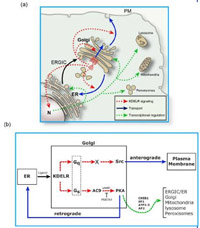Cell and molecular biology: Intracellular signaling and trafficking in cancer and rare diseases.

Several cell biology groups at the IBBC have traditionally worked in two related areas of cell biology, namely, signal transduction and intracellular membrane transport. The general objective is to investigate at the molecular level basic biological processes and exploit this knowledge to design novel drug-based therapies, and novel diagnostic approaches, in the fields of cancer and rare diseases.
Specifically, the main research areas of these groups are:
- Metabolism of the glycerophosphoinositols and of phosphatidic acid, G-protein-coupled receptors, and the ADP-ribosylation reaction; the general aim is to elucidate the cellular regulatory mechanisms that, when defective, lead to rare diseases and cancer.
- Investigation of the organizational principles and regulation of intracellular cargo transport and organelle structure; development of the required cellular models and technologies (including imaging, systems biology, bioinformatics and modeling approaches); pharmacological approaches for cancer and other diseases related to membrane transport.
- Development of advanced optical technologies based on Raman Spectroscopy and Mass Imaging to provide novel procedures for label-free characterization of single cells and single molecules.
Groups involved
Lysophospholipid Signalling for the Development of new Therapeutic Strategies
